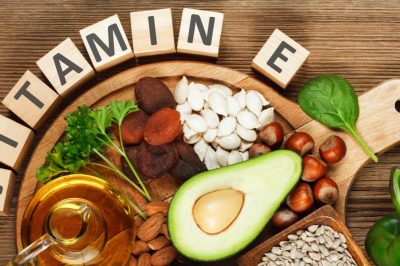However, vitamins should be taken according to individual needs with the knowledge of how to take them, and with precaution in certain cases.
Vitamin E is an important nutrient for the body because it is vital for the formation, maintenance, and longevity of red blood cells, which are responsible for carrying life-giving nutrients and oxygen throughout our bodies.
It can also protect cells against destruction by poisons in the bloodstream; it protects the adrenal and pituitary hormones; reduces blood pressure; removes cholesterol deposits from artery walls, and is involved in the breakdown of body fats.
Vitamin E is essential for a healthy heart and a healthy head of hair. Its deficiency can result in irritability, destruction of red blood cells, shortness of breath, sterility, cancer, muscle weakness, miscarriage, kidney and liver damage, and palpitations.
The British Medical Association recommends Vitamin E supplements as a preventive therapy for many people as well as in the treatment of some illnesses such as internal or external injuries, tissue damage, migraines, visual problems, skin problems, hair loss, muscular diseases, scars, and lung damage.
It is recommended for people who consume large amounts of polyunsaturated cooking oils, pregnant women, women who take birth control pills or estrogen, premature babies, those exposed to second-hand smoke or who smoke, those with impaired intestinal absorption, and women who are susceptible to keloids, high blood pressure, breast cancer, and arthritis.
Harmful Over Dosage Like All Other Vitamins
Despite its numerous benefits and uses, vitamin E supplements are not safe for everyone.
Although it is an essential fatty acid that is excreted into the urine if taken in excess, large amounts can still be harmful to some people.
Use exceeding 250mg a day over a long period of time can cause nausea, abdominal pains, vomiting, and diarrhea.
Large doses can also prevent Vitamins A, D, and K and the mineral iron from being absorbed by the stomach. People taking anticoagulants should not take it without medical supervision as it may duplicate their effects and cause complications.
Dosages over 300mg can interfere with the immune system, and dosages above 600mg can cause depression and fatigue. Women with diabetes should be aware of hypoglycemic attacks if taking large doses of Vitamin E, and blood pressure can increase with high dosages.
Food sources such as apples, brown rice, bananas, cornmeal, cantaloupe, cabbage, carrots, corn, egg yolk, fowl, grapefruit, hyssop, mustard greens, oranges, peanuts, prickly pear, parsley, rice flakes, spinach, wheat germ, ice cream, and cream are probably the most reliable sources considering the many factors associated with taking the supplement.
However, for those using supplementary Vitamin E, it should be taken no less than 8 hours apart from iron supplements. It works best when taken with selenium, manganese, inositol, phosphorus, and Vitamins A, B, and C.
However, Vitamin E can be “canceled out” by contraceptive pills, chlorine, mineral oils, polyunsaturated fats, the sugar in ice cream, or smoking cigarettes.
In summary, Vitamin E is a valuable nutrient that is readily available in food but is still often lacking in the diet of the average person. There are many diseases and conditions that respond well to Vitamin E treatment.
Taken with caution and supervision, it can provide numerous health benefits. If we “eat of the foods Allah has provided,” we will certainly reap these benefits as well as others.
This article is from our archive, originally published on an earlier date, and highlighted now for its importance




